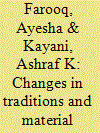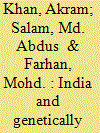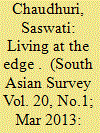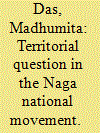|
|
|
Sort Order |
|
|
|
Items / Page
|
|
|
|
|
|
|
| Srl | Item |
| 1 |
ID:
140133


|
|
|
|
|
| Summary/Abstract |
Traditions have remained a significant aspect of social and cultural structure of societies. In this article, changes in traditions associated with vital events in Mohla, a rural community of Punjab, Pakistan, are analysed. Birth, death and marriage are considered vital events and have been analysed over a period of 50 years. Data is drawn from a sample survey conducted in the village. Systematic sampling technique was used for the selection of the respondents. The results show that material exchanges on vital events have declined, with the exception of marriage. Traditions associated with the birth of a son have remained consistent throughout the decades whereas an upward trend was observed in traditions associated with the birth of a daughter. Awareness through education was a significant reason for this change. Some traditions associated with marriages have declined, with the exception of mehndi, which has substantially increased in the recent past. Most traditions associated with death, particularly daswan and chaliswan, have declined over the decades. Changes in traditions around most of the vital events have occurred due to economic factors.
|
|
|
|
|
|
|
|
|
|
|
|
|
|
|
|
| 2 |
ID:
140129


|
|
|
|
|
| Summary/Abstract |
Given the high level of poverty, malnutrition and hunger and the low level of agricultural productivity in India, agricultural biotechnology has great potential. To feed a billion-plus population by relying on conventional methods of cultivation is next to impossible. India is rich in bio-resources and biotechnology offers opportunities for converting biological wealth into economic wealth, thereby creating new employment opportunities on an environmentally and socially sustainable basis. Biotech crops have been cultivated globally for the past two decades with no negative impact on human beings, animals and the environment. The success of Bt cotton in India in the 2000s has set an excellent example of how genetically modified (GM) technology can turn around India’s agriculture sector. Safety of GM crops being a serious issue, it is important to ensure that India has adequate regulatory instruments and infrastructures. At the same time, India has more serious food safety risks to worry about including unsanitary food processing, as well as food security concerns pertaining to the availability and affordability of food. Priority must go to more clearly demonstrated safety risks instead of hypothetical risks.
|
|
|
|
|
|
|
|
|
|
|
|
|
|
|
|
| 3 |
ID:
140126


|
|
|
|
|
| Summary/Abstract |
The issue of poverty eradication, or poverty reduction, has been at the core of development economics over the years. There had been concerted efforts to reduce rural poverty, while urban poverty was given less priority by policy-makers. However, urban areas are not free of the maladies of poverty. Urbanisation of poverty has emerged as a new phenomenon. This article attempts to use the sustainable livelihood framework to analyse changes in the livelihood strategies of the poor in the city of Kolkata. The main objective of the article is to present primary data obtained in field study as well as critical analyses on social and economic situation of urban poor in Kolkata. Due to limitations in its scope, the article does not discuss slum policy and management aspects. This article focuses on urban poverty literature based on sociological, economic and policy dimensions and explores current thinking on these issues of urban poverty.
|
|
|
|
|
|
|
|
|
|
|
|
|
|
|
|
| 4 |
ID:
140130


|
|
|
|
|
| Summary/Abstract |
Sericulture has become one of the important means of livelihood for the majority of the farmers in South India, especially in Karnataka and Andhra Pradesh. Karnataka, known as the ‘Silk Bowl of India’, occupies the top spot in producing mulberry silk in the country. Andhra Pradesh comes second in mulberry silk production in the country. Both these states have fiercely competed in mulberry silk production, which is a good sign for the sericulturists of these states. It is argued here that the implementation of new schemes in sericulture practice, post Green Revolution, has brought about the overall development of Kotha Indlu, a South Indian village that has become a ‘model village’ in Chittoor district of Andhra Pradesh. It is further suggested that the fruits of the Green Revolution are not restricted to any one section of the village: all sections of the village have benefited equally, thereby contributing to the overall development of the village.
|
|
|
|
|
|
|
|
|
|
|
|
|
|
|
|
| 5 |
ID:
140128


|
|
|
|
|
| Summary/Abstract |
Development of peripheries has always been a major challenge for large states. One of the drivers of the underdevelopment of the peripheries has been the traditional state-centric security perception. As a result, state-led development suffers from a built-in bias against the peripheries. Market signals emanating from the operation of the national economy are not strong enough to bring the resources of the peripheries into immediate use. This is the theoretical rationale to look beyond the framework of the national economy and the state-centric mindset while formulating the development strategy for border areas. Sub-regional cooperation like Bangladesh–China–India–Myanmar Forum for Regional Cooperation (BCIM) has the potential to promote growth in southwest China, Bangladesh, Myanmar and northeast India by way of utilising the complementarities of these regions. The mobilisation of cross-border synergies is destined to make the BCIM one of the economically vibrant zones that may develop the cross-border connectivity among the land-linked areas.
|
|
|
|
|
|
|
|
|
|
|
|
|
|
|
|
| 6 |
ID:
140125


|
|
|
|
|
| Summary/Abstract |
The article concerns itself with the current phase of the Indo-Naga peace talks, seemingly rendered intransigent on the contentious issue of administrative integration of contiguous Naga-inhabited areas. It historically examines the ethno-territoriality of the Naga national movement in the states of Nagaland, Manipur, Assam and Arunachal Pradesh. This article finds that notwithstanding the soundness of the claims, Naga territoriality is not a non-negotiable given but an active construction of the changing politics of the movement. The findings suggest that any proposed federal arrangement should balance ethno-territorial urges with historical peculiarities. A substantial measure of non-territorial autonomy, in a mutually binding federal arrangement, would necessitate a redefinition of both Naga ethno-national aspirations and the post-colonial Indian state’s insecurities. However, it holds the potential for sustainable peace in the region.
|
|
|
|
|
|
|
|
|
|
|
|
|
|
|
|
| 7 |
ID:
140127


|
|
|
|
|
| Summary/Abstract |
International relations (IR) has seen theoretical reshuffling in the wake of changing realities. The process of globalisation initiated a concept of global politics with thrust in de-territoriality replacing the territoriality attached with the term geopolitics. Through the prism of geopolitics, India was the ‘mainland’ of the region and the other states of the region were the ‘hinterland’. With global politics, India again becomes the ‘mainland’ for global economic flows with its immediate neighbours as the ‘hinterland’. With geopolitics, India could afford to have frictions with its regional neighbours, an option that is not open to it with global politics. The article argues that India is reshuffling the South Asian region to meet the realities of global politics and concludes that while at the level of theory IR are changing towards de-territoriality, the ground reality imprints the importance of the realities of geography and demography of big nation states.
|
|
|
|
|
|
|
|
|
|
|
|
|
|
|
|
| 8 |
ID:
140132


|
|
|
|
|
| Summary/Abstract |
Globalisation and post-colonialism have created new religio-cultural geographies and articulations in many countries. Many aspects of Hindu religion have been transnationally stretched and (re)enacted within new migrant and diasporic spaces, in turn reshaping and somewhat changing how ritual and religious enactments come to be enunciated. This article focuses on the yajna as a plastic and symbolic resource that is enacted in a transnational context and within new idioms and vocabularies of religious expression. The article engages with Lubin’s (2001) thesis that the ‘public’ and visible aspect of yajna functions as a civic ‘spectacle’ and probes the performance element of this so-called ‘spectacle’, and looks at how it becomes re-ritualised and re-enacted to fit the contemporary needs of transnational and diasporic Hindu communities.
|
|
|
|
|
|
|
|
|
|
|
|
|
|
|
|
| 9 |
ID:
140123


|
|
|
|
|
| Summary/Abstract |
Revolutionary Association of the Women of Afghanistan (RAWA) became a well-known feminist organisation during the rule of the Taliban, when it dedicated itself to bringing the abuses of Taliban against women in Afghanistan to worldwide attention. RAWA was briefly allied with the Feminist Majority Foundation (FMF) when this United States (US)-based organisation also made the plight of women in Afghanistan a priority. However, disagreements between the two organisations soon came to light. This article examines the experiences of RAWA’s interactions with FMF using Appadurai’s imaginary landscapes as a theoretical basis. RAWA’s experiences demonstrate the disjunctures and unevenness that are part of these landscapes. While initially very successful in spreading its messages through its website, RAWA struggled to become a strong political player in Afghanistan and internationally, partly due to unwillingness to compromise and partly because of the difficulties faced in navigating the uneven terrain of mediascapes and ideoscapes upon which it used to promote its cause.
|
|
|
|
|
|
|
|
|
|
|
|
|
|
|
|
|
|
|
|
|